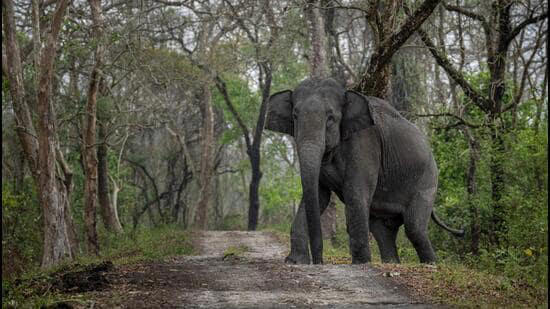In a heart-wrenching incident that sheds light on the ongoing human-wildlife conflict in Assam, an elephant met a tragic end after being hit and dragged by a speeding train. The incident, which occurred near a railway track in Assam, not only highlights the vulnerability of wildlife but also underscores the urgent need for better conservation efforts and infrastructure planning to mitigate such accidents.
The elephant, a majestic creature wandering through its natural habitat, inadvertently crossed paths with the speeding train. Despite efforts by wildlife officials and concerned citizens to prevent such collisions, incidents like these continue to occur, posing a significant threat to both wildlife and human lives.
Assam, known for its rich biodiversity and lush forests, has long been a habitat for various wildlife species, including elephants. However, rapid urbanization and infrastructure development have led to the fragmentation of their habitats, forcing these gentle giants to navigate through human-dominated landscapes in search of food and shelter. Unfortunately, this often brings them into direct conflict with humans and vehicles, leading to tragic consequences.
The recent incident serves as a stark reminder of the pressing need for effective measures to protect both wildlife and humans. One such measure is the implementation of wildlife corridors and fencing along railway tracks to prevent such accidents. These corridors provide safe passage for animals to move between fragmented habitats, reducing the chances of collisions with trains and vehicles.
Furthermore, raising awareness among the public about the importance of wildlife conservation and the need to coexist harmoniously with animals is crucial. Communities living in areas inhabited by wildlife must be educated about the significance of preserving natural habitats and adopting practices that minimize conflicts.
In addition to preventative measures, swift action must be taken to address the aftermath of such incidents. Following the tragic death of the elephant in Assam, efforts were made to retrieve its body and conduct a post-mortem examination to ascertain the cause of death. This not only helps in understanding the circumstances leading to the incident but also provides valuable insights for future conservation efforts.
Moreover, authorities need to explore innovative solutions to mitigate human-wildlife conflicts, such as the use of technology to monitor animal movements near railway tracks and alert train operators in real-time. Collaboration between government agencies, wildlife organizations, and local communities is essential to develop and implement effective strategies for wildlife conservation and conflict resolution.
The loss of a single elephant is not just a tragedy for its species but also a stark reminder of the larger environmental challenges we face. Wildlife plays a crucial role in maintaining the ecological balance of our planet, and their continued existence is vital for the well-being of ecosystems and biodiversity.
As we mourn the loss of the elephant in Assam, we must channel our grief into action. It is imperative that we prioritize the protection of wildlife and their habitats, not only for their sake but for the future of our planet. Every individual has a role to play in conservation efforts, whether it be through supporting local initiatives, advocating for policy changes, or simply spreading awareness about the importance of coexisting with wildlife.
In memory of the elephant tragically killed in Assam, let us pledge to do better and work towards creating a world where humans and wildlife can thrive together in harmony. Only through collective action and a deep sense of responsibility can we ensure a brighter and more sustainable future for all inhabitants of this planet.



